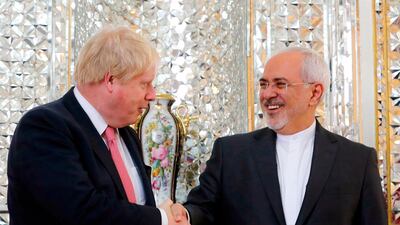The UK’s foreign secretary has spoken “frankly” to his Iranian counterpart about imprisoned British mother Nazanin Zaghari-Ratcliffe, who is being held over spying charges.
In a two hour meeting with Iranian foreign minister Mohammed Javad Zarif in Tehran, Boris Johnson touched on a number of different areas, including the plight of the jailed aid worker.
A foreign office spokesman said: "They discussed the full range of bilateral issues and they both spoke frankly about the obstacles in the relationship, including the foreign secretary's concerns about the consular cases of British-Iranian dual nationals.
"Both emphasised their commitment to continuing to work together to improve the bilateral relationship."
The spokesman added that the meeting had been “constructive”.
_______________
Read more:
Nazanin release: husband on ‘tenterhooks’ about Boris visit to Iran
Boris Johnson to raise Iranian dual national's release during Middle East trip
_______________
“During two hours of frank talks, they agreed to work together to make progress on a number of the most important bilateral and regional security issues.
“The foreign secretary began by expressing his condolences for the powerful November earthquake which struck Iran's border region with Iraq.
“He then moved on to the nuclear deal, underlining the UK's continued support for the deal and determination that it should be fully implemented.
“They also talked at length about the breadth of regional issues and the need for regional partners and the international community to work together to find solutions.
“Overall, it was a useful meeting at the start of the foreign secretary's visit to Iran.”
Ahead of the visit, Mr Johnson had spoken of his desire to secure the release of Mrs Zaghari-Ratcliffe and other dual British-Iranian nationals being held in Iran. “We will … discuss our bilateral relationship and I will stress my grave concerns about our dual national consular cases and press for their release where there are humanitarian grounds to do so.”
Mrs Zaghari-Ratcliffe was imprisoned in Tehran in April 2016, accused of plotting the "soft toppling" of Iran's government while travelling there with her toddler daughter.
As the British foreign secretary flew into Iran on Saturday, Mrs Zaghari-Ratcliffe’s husband, Richard Ratcliffe, talked of his anxiety about the chances for his spouse’s release.
“I’m waiting on tenterhooks – biting my nails,” Mr Ratcliffe said. “I’m really pleased [Mr Johnson] is there in time for Nazanin’s trial and waiting to see what will happen, and trying not to have too clear expectations at all.”
Mr Ratcliffe said the foreign secretary was hoping to visit his wife in jail, as well as securing a meeting with the head of the Iranian judiciary, who acts independently of the country’s political system, even president Hassan Rouhani. Mr Ratcliffe had hoped to accompany Mr Johnson on the trip to see his wife for the first time in 19 months but this had been impossible to achieve.
“If I’m blunt, it is better that he is there in time for her trial than he and I go there after her trial and she’s been sentenced to more years,” said MR Ratcliffe. “Obviously I want her to be home – it’s better to see her than not see her for months and months and months.”
He said: “I’m more hopeful, with the announcement of him going. It feels to me that there are no guarantees but that it is possible that she would be home for Christmas. And that possibility is worth holding on to.”
Mr Ratcliffe last spoke to his wife by phone on Tuesday, when she had been “genuinely worried about the court case and getting quite agitated”.
Meanwhile, the BBC has asked Johnson to also bring up the freezing of assets of more than 150 people associated with its Persian service, something the broadcaster complained about to the United Nations in October.
The BBC’s Farsi-language service was barred from operating in Iran after its disputed 2009 presidential election, though the broadcaster says the service reaches some 18 million people weekly.
“We call upon the Iranian authorities to stop the harassment and persecution of our staff and their families,” the BBC said.

